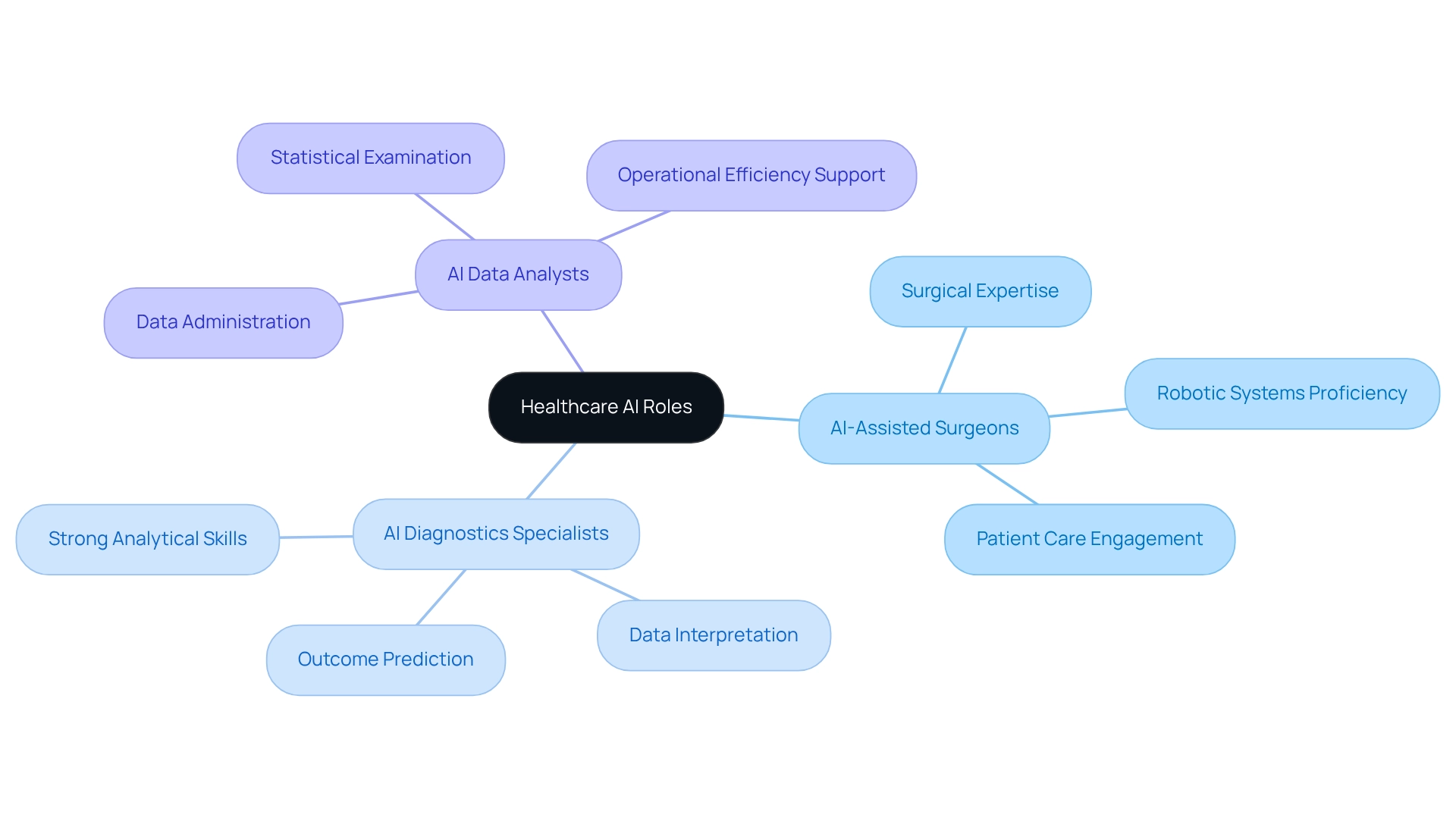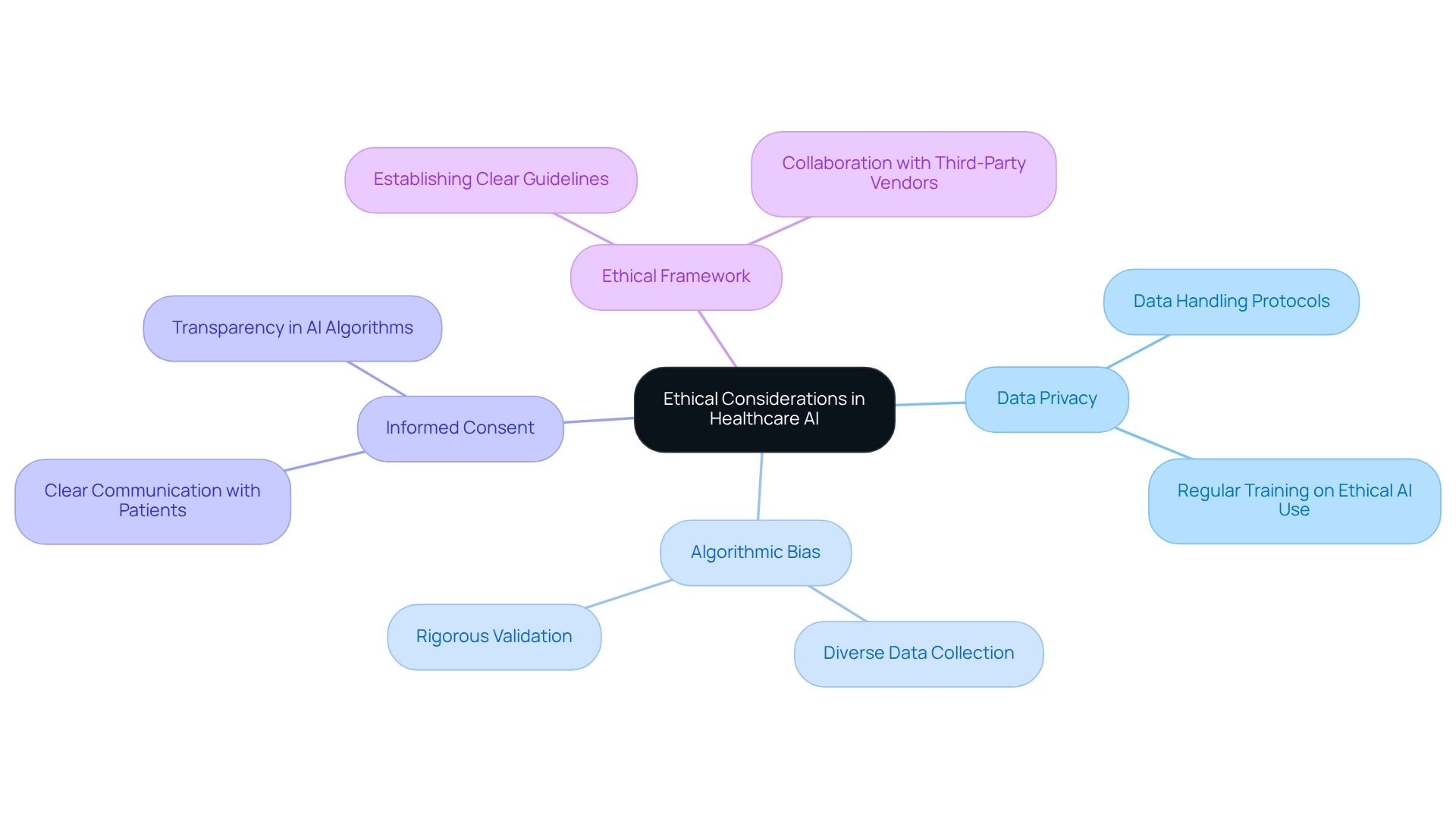Overview
In the evolving landscape of healthcare, AI careers are emerging as a beacon of hope for professionals dedicated to enhancing patient care. These roles are not just about technology; they are about understanding the emotional challenges that healthcare providers face daily. The integration of artificial intelligence into medical settings is driven by a profound need for improved patient care and operational efficiency.
As we delve into this field, it's essential to recognize the growing demand for these positions. How often do we hear about the administrative burdens that detract from the time healthcare providers can spend with their patients? By embracing AI, we can alleviate some of these pressures, allowing professionals to focus on what truly matters—caring for patients.
Moreover, ethical considerations play a crucial role in this expansion. As AI technologies become more prevalent, the importance of maintaining compassion and understanding in healthcare cannot be overstated. This is a field that not only offers numerous opportunities for professionals but also promises to reshape the future of patient care in a nurturing way.
Are you ready to explore the possibilities that a career in healthcare AI can offer? Together, we can create a future where technology and empathy work hand in hand to improve lives. Let’s engage in this conversation and discover how you can be part of this transformative journey.
Introduction
In a world where technology is transforming every facet of our lives, the healthcare sector is leading this change, especially with the integration of artificial intelligence (AI). This shift is not just about innovation; it’s about addressing the emotional challenges faced by healthcare providers. The rise of healthcare AI careers is reshaping the landscape, presenting a variety of roles that enhance patient care while alleviating administrative burdens.
Imagine AI specialists who interpret complex data, or AI-assisted surgeons using robotic systems for precision. These professionals play a crucial role in connecting advanced technology with compassionate healthcare. As the demand for AI in healthcare grows, it becomes vital for aspiring professionals to understand the evolving roles and ethical considerations in this field.
Are you ready to make a meaningful impact in this rapidly changing environment? Embracing AI in healthcare not only improves operational efficiency but also fosters a deeper connection with patients. Together, we can navigate this transformation and ensure that technology serves to enhance the human touch in healthcare.
Defining Healthcare AI Careers: An Overview
in the medical field encompass a diverse array of roles that integrate artificial intelligence technologies into medical environments. These roles, including AI specialists, data analysts, and clinical informatics professionals, are dedicated to enhancing patient care through innovative solutions. The growing demand for AI in medical services stems from the pressing need for improved efficiency, accuracy, and patient engagement. This need makes [healthcare AI careers](https://cosmaneura.com/newsroom1/tag/AI+in+Healthcare) increasingly vital in today's healthcare landscape, and current statistics reveal that 66% of surveyed physicians recognize the benefits of AI in medicine. However, only 38% were utilizing it at the time of the study, highlighting a significant gap in adoption that presents opportunities for growth.
By 2025, the sector of healthcare AI careers is expected to expand, reflecting a rising dependence on AI innovations. Notably, North America holds a leading 59.1% share of the AI medical market, underscoring the region's essential role in fostering innovation and investment in this sector, which creates numerous opportunities for healthcare AI careers as AI technologies continue to advance.
The importance of AI experts in medical settings cannot be overstated; they play a crucial role in implementing and enhancing AI solutions that improve clinical outcomes. Recent trends indicate a growing interest in AI-driven positions, with 75.7% of radiologists expressing trust in AI-based algorithms for diagnostic outcomes. This confidence is vital for promoting collaboration between AI technologies and medical practitioners, ultimately enhancing the quality of care provided to patients.
In conclusion, understanding available in the field of AI for medicine is essential for professionals aiming to navigate this rapidly evolving environment. The integration of AI into medical services not only transforms job functions but also elevates the standard of patient care. This makes healthcare AI careers a promising field for future career development, encouraging professionals to engage with the opportunities that lie ahead.
Exploring Key Roles in Healthcare AI: Skills and Responsibilities
In the evolving landscape of healthcare, key roles in healthcare AI careers, such as AI-Assisted Surgeons, , and AI Healthcare Data Analysts, play a crucial part in enhancing patient care. Each role requires a distinct skill set, and understanding these can help address the emotional challenges faced by healthcare providers. AI-Assisted Surgeons blend surgical expertise with proficiency in robotic systems, leveraging technology to achieve greater precision in procedures. Meanwhile, AI Diagnostics Specialists possess strong analytical skills, enabling them to interpret complex data and predict outcomes effectively. On the other hand, AI Data Analysts focus on data administration and statistical examination, ensuring that insights gleaned from data improve medical service delivery.
The responsibilities of these roles vary significantly. AI-Assisted Surgeons engage directly with patient care, utilizing advanced tools to enhance surgical outcomes. In contrast, AI Diagnostics Specialists analyze individual information to guide clinical decisions, while AI Data Analysts work diligently behind the scenes, processing information to boost operational efficiency and support strategic initiatives. As we witness the integration of AI into medical services, it becomes essential for aspiring professionals to understand healthcare AI careers and these roles. For instance, a recent study revealed that approximately 39% of U.S. adults feel comfortable with AI's involvement in their medical care. This growing acceptance underscores the importance of equipping future medical professionals with the skills necessary to navigate this dynamic landscape. By doing so, we can ensure they are prepared to contribute effectively to patient care and operational excellence.
Reflecting on these developments, how might we better support our healthcare professionals in adapting to these changes? Understanding the significance of these roles not only empowers those in the field but also fosters a more compassionate healthcare environment. Together, let’s embrace this journey towards a more integrated and supportive approach to patient care.

The Evolution of Healthcare AI Careers: Trends and Future Outlook
The evolution of healthcare AI careers brings to light the emotional challenges faced by healthcare providers, particularly as they navigate the rapid advancements in technology. As telehealth expands, personalized medicine gains traction, and data analytics becomes crucial, job roles within the sector are being redefined. However, many medical practitioners, especially physicians, express concerns about maintaining the standard of care and the quality of client interactions. This apprehension underscores the need for professionals who can compassionately communicate the benefits of AI solutions and address these worries.
Consider the challenges highlighted in the case study 'Traditional Accelerators Aren't Equipped to Support Healthcare Startups.' Startups often struggle to overcome resistance to innovation, which can impede progress. By 2025, it is anticipated that healthcare AI careers will see more extensive adoption of AI technologies by medical organizations. This shift will create new healthcare AI careers focused on AI ethics, compliance, and patient engagement, reflecting not just technological advancement but also the need for experts who can manage the complexities of AI while ensuring alignment with patient-centered care principles.
With an annual growth rate projected at 28.46%, the AI market is expected to reach $826.7 billion by 2030. This growth emphasizes the critical role of AI in driving economic expansion and innovation across various sectors. As more medical providers recognize AI's potential—83% of physicians believe it could address —the demand for skilled professionals in healthcare AI careers is set to increase significantly. This evolution will shape the future landscape of medical careers, inviting compassionate individuals to lead the way in integrating technology while prioritizing patient care.
Ethical Considerations in Healthcare AI Careers: Balancing Innovation and Patient Care
Ethical considerations in healthcare AI careers are incredibly important as professionals face complex challenges surrounding data privacy, algorithmic bias, and informed consent. With AI technologies becoming more prevalent, the potential for ethical dilemmas increases, underscoring the need for a strong ethical framework within medical organizations. A significant 58% of medical executives are likely to implement or purchase AI solutions within the next year, emphasizing the urgency for ethical oversight in these advancements.
Experts in this field must prioritize client welfare, ensuring that AI applications enhance care quality rather than compromise it. The presence of algorithmic bias in medical AI poses a serious risk, making it essential to collect diverse data and conduct rigorous validation to mitigate these biases. For example, a case study on transparency in AI algorithms highlights the necessity for clear guidelines and common metrics to assess AI's reliability and trustworthiness in clinical settings, demonstrating how such measures can improve ethical practices.
By fostering a culture of ethical responsibility through specific actions—such as regular training on and establishing clear protocols for data handling—AI practitioners in the medical field can build trust with patients and stakeholders. This commitment to ethical practices not only leads to improved health outcomes but also supports a sustainable integration of technology in medical services. As 59% of surveyed medical leaders implementing generative AI are already collaborating with third-party vendors to develop customized solutions, it is crucial to ensure that ethical considerations guide these partnerships. Ultimately, a strong ethical foundation in healthcare AI careers is vital for navigating the complexities of innovation while safeguarding patient care.
How can we, as a community, ensure that our advancements in AI remain rooted in ethical practices? Let's work together to create a future where technology enhances patient care without compromising our values.

Conclusion
The integration of artificial intelligence into healthcare is not just a technological advancement; it represents a transformative shift that is reshaping the roles and responsibilities of healthcare professionals. Have you felt the weight of administrative burdens affecting patient care? As explored throughout this article, the rise of healthcare AI careers encompasses a variety of positions, including:
- AI specialists
- Data analysts
- AI-assisted surgeons
Each of these roles plays a pivotal part in enhancing patient care and operational efficiency. With the growing acceptance of AI technologies among healthcare providers and patients alike, the demand for skilled professionals in this field is set to surge.
Understanding the specific skills and responsibilities associated with key roles in healthcare AI is essential for aspiring professionals. As the landscape continues to evolve, embracing the ethical considerations surrounding AI implementation will be crucial. Addressing challenges such as data privacy and algorithmic bias ensures that the integration of AI serves to enhance, rather than undermine, patient care. How can we ensure that technology complements the human touch in healthcare?
In summary, the future of healthcare AI careers is bright, characterized by continuous growth and innovation. As healthcare organizations increasingly recognize the potential of AI to tackle industry challenges, there exists a significant opportunity for professionals to make a meaningful impact. By prioritizing ethical practices and fostering collaboration between technology and compassionate care, this emerging field is poised to redefine what it means to provide quality healthcare in the modern age. The journey ahead is not just about technology; it is about enhancing the human touch in healthcare through intelligent solutions. Let us embrace this opportunity together, ensuring that our advancements in AI serve to uplift and support the very essence of care.




